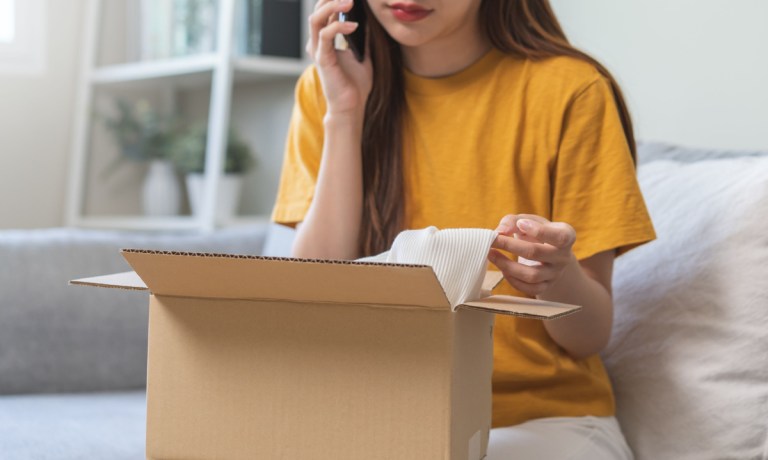ReturnQueen Founders Are on a Mission to Make Returns a Brand-Building Experience

Returns have long been a cumbersome process for consumers, commonly regarded as a task most of them detest. This intense dislike has gradually permeated through brands and retailers, impacting their overall profitability, albeit not in the conventional sense. Customers do engage in returns, but their impact on a retailer’s bottom line tends to be far from positive.
In April, PYMNTS reported that eCommerce giant Amazon was implementing new fees on certain returns in order to offset the costs associated with the process. The new fee became applicable to customers who returned a product to a UPS Store instead of using a closer Whole Foods, Kohl’s or Amazon Fresh location.
Read more: Amazon Charging New Fees on Some Returns
The move is in line with those of other retailers that have looked to rein in returns costs, especially as inflation continues to not only impact consumer spending (which may cause consumers to rethink any initial purchases made, spiking return rates) but ultimately brands and retailers.
Taking a cue from Zara, H&M implemented return charges in September 2022.
Moreover, brands and retailers have looked to reevaluate their return policies by reducing the return window and introducing return or restocking fees.
See: What Zara and H&M Are Getting Wrong About Charging for Returns
While the goal is to discourage returns and encourage more confident purchasing decisions, how does this impact the consumer? And since returns are inevitable, how can they be done without feeling the burn?
In an interview with PYMNTS, Dasya Katz and Daphna Englard, founders and co-CEOs of ReturnQueen, shed light on their strategy to address the burdensome nature of returns. Their approach aims to not only simplify the return process for consumers but also mitigate its negative impact on a retailer’s bottom line.
Katz and Englard said they empathized with those struggling to balance their work responsibilities and the demands of returns, and saw an opportunity to alleviate this burden.
How ReturnQueen Makes Money
ReturnQueen provides a convenient pickup service for packaged returns at a fixed rate of $7 per pickup, regardless of the quantity of packages or the specific retailer involved. The service specifically caters to pre-packaged boxes with labels already attached, guaranteeing a hassle-free experience for customers.
Apart from the regular pickup service, ReturnQueen offers a premium option called “Full Circle Premium Service” for $9.
Additionally, ReturnQueen offers a membership program where customers can pay a monthly subscription fee of $19. The membership entitles them to unlimited pickups from a selection of retailers. Alternatively, customers can opt for a $99 annual membership, which also provides unlimited pickups from any number of retailers.
The Impact on Small Businesses
Drawing from their own experiences as shoppers, Katz and Englard noted the apprehension many customers feel when purchasing from small or mid-sized retailers.
“As experienced shoppers, we would always be nervous to buy from the small businesses to buy from the mid-sized retailers and we would always go to the Amazons of the world,” they said.
This was due to the larger companies’ simplified return policies and the desire to avoid the complexities associated with multiple returns. They set out to provide a solution that would make returns easy and hassle-free for every store, regardless of its size.
Katz and Englard said the company has seen a diverse range of customers from various retailers utilizing their service, including small businesses. ReturnQueen’s ability to provide a premium return service has become a valuable resource for smaller retailers, enabling them to offer a level of service that often surpassed what larger eCommerce platforms could provide.
Do Easy Returns Encourage Excess Ordering?
To encourage customers to shop with confidence, ReturnQueen came up with a user-friendly app that displays customers’ purchases and streamlines the return process. The idea is to help shoppers make smart purchasing decisions, and still allow them to promptly return items that do not meet their expectations.
While initially concerned about the potential for excessive returns and wasteful shopping practices, ReturnQueen’s data reportedly shows a different story.
How ReturnQueen Works
When a customer signs up for the service, the initial setup process (which is not mandatory, but recommended) is designed to be straightforward. During this setup, customers are prompted to connect their Gmail account. This enables ReturnQueen to display all their purchases in a neatly organized list, sorted by return deadlines.
This feature allows customers to easily identify items that are approaching their return deadline. The items nearing the seventh day of the return period are highlighted in red, as a reminder for customers to take action if needed.
Additionally, customers can also link their Amazon accounts to access detailed order information and retrieve labels. ReturnQueen aims to generate as many return labels as possible on behalf of the customer, reducing the need for them to individually email specific retailers for return labels.
ReturnQueen has closely monitored customer engagement and satisfaction and observed that more than 70% of customers schedule a second pickup after experiencing the service.
Read also: Retailers Pin Hopes on AI to Increase Sales, Decrease Returns
Consumers seeking to benefit from ReturnQueen’s services can now do so, as the company has expanded its operations nationwide. The expansion enables customers to access ReturnQueen’s services for returns from any store, regardless of their location within the United States.